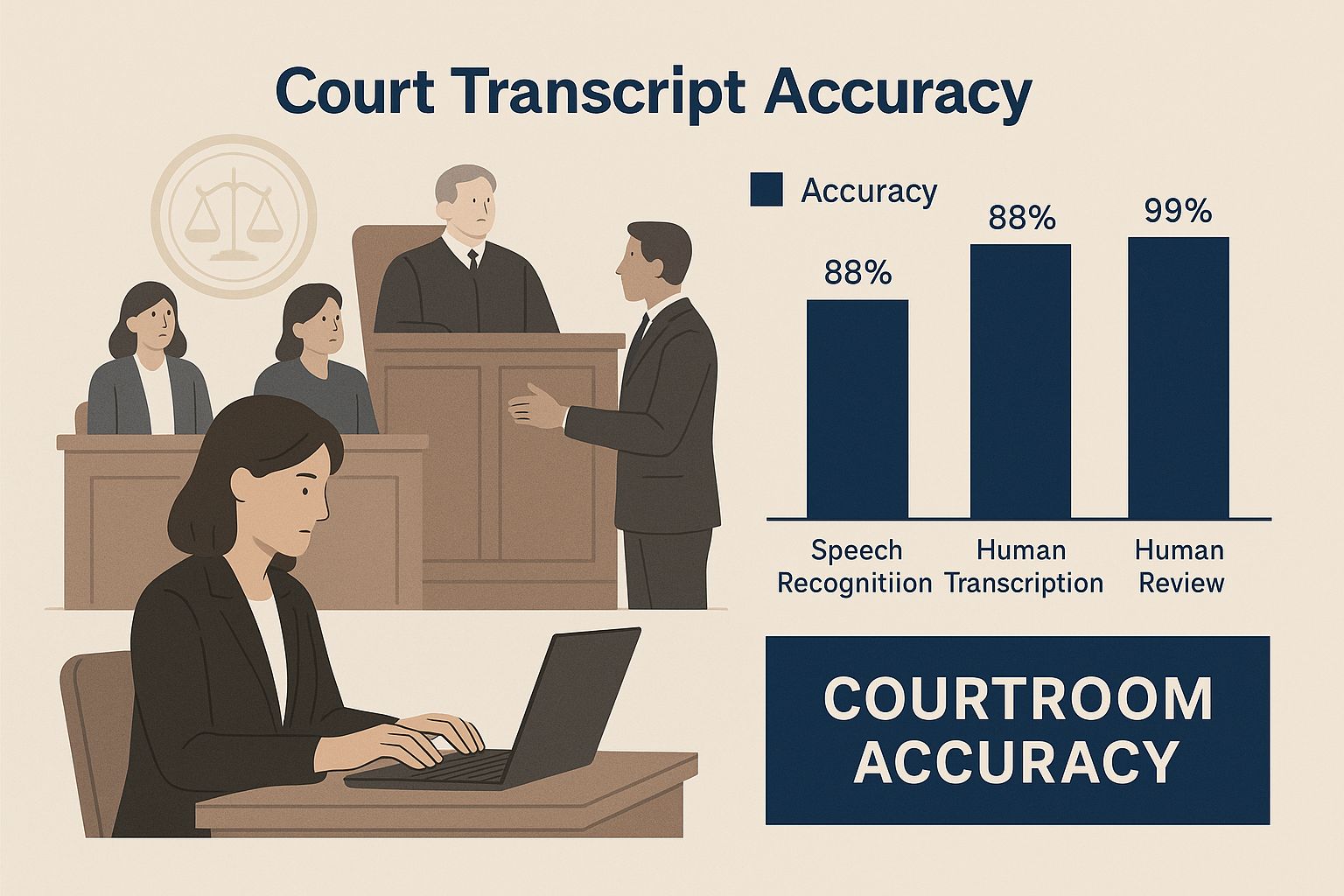7 Ways Legal Transcription Services Boost Your Law Practice
The Evolution of Legal Transcription: What Modern Firms Need
The legal field is constantly changing, and staying ahead of the curve is vital for any successful law firm. One key area experiencing a rapid evolution is legal transcription. The traditional methods are being replaced with more efficient digital solutions, significantly impacting how modern firms operate. Understanding these shifts is essential for maintaining a competitive edge.
From Stenography to Digital Solutions
Traditional stenography, while still relevant, faces limitations in speed and accessibility. Digital recording combined with AI-powered transcription services offers a significantly more efficient alternative. Services like Otter.ai can quickly transcribe audio and video recordings from depositions, hearings, and client interviews into searchable text documents. This provides legal professionals with faster access to crucial information.
The Importance of Specialized Legal Transcription
Generic transcription services often lack the nuanced understanding of legal terminology and procedures necessary for accurate legal transcription. Specialized legal transcription services employ transcriptionists trained in legal vocabulary, formatting conventions, and the intricacies of legal proceedings. This ensures transcripts are not only verbatim but also contextually accurate, reflecting the intended legal meaning. This precision is vital for effective case preparation and avoids potential misinterpretations.
The legal transcription market is experiencing significant growth. Valued at roughly USD 3.5 billion in 2023, the market is projected to grow at a CAGR between 6.5% and 6.8% over the next ten years. This expansion, fueled by the increasing complexities of legal work and advancements in AI and Natural Language Processing (NLP), highlights the growing importance of dedicated legal transcription services. For more in-depth statistics, see: Learn more about the legal transcription market. Furthermore, firms can benefit from optimizing their online presence with strategies like those found in this guide: SEO for Law Firms.
Document Types Benefiting From Transcription
Many document types within a legal practice benefit from professional legal transcription. Depositions, hearings, and court proceedings are key examples. Additionally, client interviews, witness statements, and even internal meetings can be invaluable resources when transcribed. Accurate transcripts create a searchable record vital for case strategy, legal research, and internal knowledge management. This thorough documentation also supports compliance and streamlines communication within the firm.
Unlocking Firm Efficiency Through Strategic Transcription
Legal transcription services are more than just a convenient option; they represent a strategic investment capable of significantly boosting a law firm's efficiency. By outsourcing transcription, firms liberate valuable time for attorneys and paralegals, allowing them to concentrate on higher-value tasks like case strategy development and client interaction. This shift ultimately leads to increased client satisfaction and a healthier bottom line.
Transforming Workflows and Reclaiming Time
Consider legal transcription this way: if attorneys spend hours transcribing recordings, it's akin to a master chef peeling potatoes. They can perform the task, but their expertise is best applied elsewhere. Professional legal transcription services enable legal professionals to delegate these administrative duties, streamlining their workflows and enhancing overall productivity.

This infographic illustrates the crucial role of accuracy in courtroom transcription. The visualization emphasizes that accurate transcripts form the bedrock of a fair legal process. These transcripts act as a dependable record, safeguarding against misinterpretations and guaranteeing that all involved parties have access to the precise details of the legal proceedings.
The Financial Advantages of Outsourcing
Many firms miscalculate the true cost of in-house transcription. Beyond salaries, expenses like equipment, software, training, and the lost productivity of legal professionals involved in transcription contribute to the total cost. Outsourced legal transcription services frequently offer a more budget-friendly alternative, particularly when factoring in these hidden costs.
This is especially important given the current market trends. Recent data reveals the U.S. leading the global legal transcription market. In 2024, the U.S. transcription market reached a value of USD 30.42 billion and is forecast to expand at a CAGR of 5.2% through 2030. You can find more comprehensive statistics here. The legal sector represents a substantial portion of this larger market, highlighting the rising demand for these services.
To further illustrate the cost savings, let's look at a direct comparison:
Introducing a table that breaks down the costs associated with in-house vs. outsourced transcription services, enabling you to see the potential annual savings.
Cost Comparison: In-House vs. Outsourced Legal Transcription This table compares the financial implications of managing transcription internally versus partnering with professional legal transcription services.
| Cost Factor | In-House Transcription | Outsourced Transcription Services | Annual Savings Potential |
|---|---|---|---|
| Staff Salaries | $50,000/year per transcriptionist | Variable, depending on volume and service provider | $20,000 - $50,000 |
| Software & Hardware | $5,000 initial investment + $1,000/year maintenance | Included in service fee | $1,000 - $5,000 |
| Training & Management | $2,000/year per transcriptionist | Included in service fee | $2,000+ |
| Lost Productivity (Attorneys/Paralegals) | Estimated $10,000/year per attorney/paralegal | Negligible, as professionals focus on core tasks | $10,000+ |
| Total Estimated Annual Cost | $67,000+ | $15,000 - $35,000 (estimated based on average market rates) | $32,000 - $52,000+ |
As you can see, the potential for significant savings is clear. Outsourcing eliminates the fixed costs of salaries, equipment, and training, while also minimizing the opportunity cost of lost productivity.
Building a Knowledge Base With Precise Transcripts
Accurate transcripts are more than just records for immediate use; they become a valuable asset within a firm's knowledge base. They provide a searchable repository of past cases, depositions, and other legal proceedings. This easily accessible information can be utilized for future case preparation, legal research, and internal training, further increasing the long-term value of professional legal transcription services.
Explore more on legal document automation software. This wealth of data enables firms to build on past successes and learn from previous experiences, ultimately improving legal strategies and outcomes. You might also be interested in: How to master legal workflows.
The Tech Revolution Reshaping Legal Transcription

The legal transcription landscape is evolving. Technology is rapidly changing how this crucial legal process functions, impacting everything from turnaround times to the security measures used to protect sensitive information. For law firms aiming to stay ahead, understanding these shifts is essential.
AI-Driven Speech Recognition and Accuracy
Perhaps the most significant advancement is the use of AI-driven speech recognition. This technology has drastically reduced turnaround times, often delivering transcripts within hours or even minutes. Remarkably, this increased speed doesn't sacrifice accuracy. AI algorithms, trained on vast legal datasets, accurately recognize even complex legal terms.
These algorithms also learn and adapt. Through continuous exposure to specialized vocabulary and jurisdictional nuances, their accuracy constantly improves, providing increasingly reliable transcripts for legal professionals.
Cloud-Based Platforms and Collaboration
Cloud-based platforms are also transforming legal transcription. These platforms provide real-time collaboration between attorneys and transcriptionists. Attorneys can access transcripts during proceedings, enabling them to immediately review testimony and address any ambiguities.
This real-time access significantly improves workflow efficiency and ensures accuracy. Law firms can also use these modern platforms to bolster client communication. Tools like Live Chat offer valuable opportunities for immediate connection. For more on workflow optimization, consider resources like this article on How to master legal workflows.
Enhanced Security and Compliance
Security is paramount in the legal world. Modern transcription services address this with robust measures. Advanced encryption protects sensitive client data during transmission and storage. Access controls restrict access to authorized individuals, and compliance frameworks ensure adherence to data protection regulations.
These technological advances are setting a new standard for legal transcription. By 2025, AI-powered tools allowed legal professionals to generate transcripts with impressive speed and accuracy, often in real time. This innovation is projected to drive significant market growth, with estimates indicating a CAGR of 6.5% to 6.8% in subsequent years. Learn more about these trends here.
These advancements are not just about efficiency; they represent a significant shift in how legal transcription operates, providing crucial benefits for forward-thinking law firms.
Finding Your Perfect Legal Transcription Partner
Selecting the right legal transcription service is a crucial decision for any law firm. It can significantly impact operational efficiency and overall success. Finding the lowest price shouldn't be the only goal; a comprehensive assessment of a provider’s capabilities is essential.
Why Legal Expertise Matters
General transcription services often fall short when dealing with the intricacies of legal language. Misinterpretations of legal jargon can lead to inaccuracies, compromising the integrity of the transcript. A specialized legal transcription service, staffed with transcriptionists trained in legal terminology, ensures accuracy and a proper understanding of the legal context. This specialized knowledge is vital for capturing the complexities of legal proceedings and arguments.
Security and Compliance: Protecting Your Data
Confidentiality is paramount in legal practice. When choosing a legal transcription service, prioritize providers who have implemented strong security measures. Look for certifications such as HIPAA compliance and well-defined confidentiality protocols. These safeguards protect your firm and your clients’ sensitive data.
Quality Assurance: The Hallmark of Excellence
The quality of transcription services can vary significantly. Leading providers implement rigorous quality assurance processes, often employing multi-tier review systems. These systems involve multiple transcriptionists and proofreaders meticulously reviewing each transcript to ensure accuracy. Some services even offer accuracy guarantees, underscoring their dedication to quality. Engage providers specializing in legal proofreading for a final quality check.
Practical Considerations: Turnaround Time and Technology
Besides security and quality, practical factors such as turnaround time are important. Different services offer varying turnaround times, ranging from same-day delivery to standard options. Select a service that aligns with your firm's specific requirements. Also, ensure technological compatibility with your existing systems for seamless integration. For further information on optimizing your practice, consider reading this article on practice management solutions.
The Importance of a Service Trial
A service trial provides invaluable insights into a provider's capabilities. By testing their services with authentic audio or video files from your practice, you can directly assess the accuracy, turnaround time, and overall quality. This hands-on approach is the most effective way to determine if a provider truly meets your firm’s needs.
Key Evaluation Criteria: A Checklist
Before choosing a legal transcription service provider, it's helpful to have a structured approach. The following table outlines key evaluation criteria and provides questions to ask potential providers, along with red flags to watch out for.
To help you in your selection process, we've compiled a comparison matrix highlighting key evaluation criteria:
Legal Transcription Service Provider Comparison Matrix: This table presents key evaluation criteria to consider when selecting a legal transcription service provider
| Evaluation Criteria | Priority Level | Questions to Ask Providers | Red Flags to Watch For |
|---|---|---|---|
| Legal Expertise | High | Do your transcriptionists have specific legal training? | Lack of familiarity with legal terminology. |
| Security & Compliance | High | What security certifications do you hold? How do you ensure client confidentiality? | Vague or insufficient security measures. |
| Quality Assurance | High | What is your quality assurance process? Do you offer accuracy guarantees? | Lack of a clear quality control process. |
| Turnaround Time | Medium | What turnaround times do you offer? | Inconsistent or unreliable turnaround times. |
| Technology Compatibility | Medium | Is your service compatible with our existing software? | Difficulty integrating with your systems. |
| Pricing | Medium | What are your pricing structures? | Hidden fees or unexpected charges. |
| Customer Support | Medium | What type of customer support do you provide? | Unresponsive or unhelpful customer service. |
This table helps summarize important points to consider when making your decision. By carefully evaluating these factors, you can choose a legal transcription partner that enhances your firm’s efficiency and provides effective support for your legal practice.
Seamless Integration: Making Legal Transcription Work For You
Successfully integrating legal transcription services into your law firm requires a strategic approach. This involves assessing your current needs and pinpointing any pain points these services can address. This section offers practical guidance for seamless integration, from optimizing audio recordings to implementing change management strategies.
Assessing Your Transcription Needs
Start by thoroughly evaluating your current documentation processes. Where are the bottlenecks? Are your attorneys spending too much time transcribing recordings themselves? How much time could be saved by outsourcing this task? Quantifying these factors helps justify the investment in legal transcription services and demonstrates the potential return on investment (ROI).
For example, if an attorney bills at $300/hour** and spends 5 hours a week on transcription, that's **$1,500 in lost billable time. Over a year, this equates to $78,000. This cost analysis clearly highlights the financial benefits of using legal transcription services.
Optimizing Audio Recording Practices
The quality of your audio recordings directly impacts the accuracy of your transcripts. Invest in high-quality recording equipment like Zoom or Tascam and be mindful of the recording environment. Minimize background noise and ensure clear speaker identification. This seemingly small detail can significantly improve transcription accuracy and reduce the need for later corrections.
- Use a dedicated microphone: This helps isolate the speaker's voice.
- Choose a quiet location: Avoid areas with high traffic or ambient noise.
- Position the microphone correctly: Ensure it's close enough to capture clear audio.
Establishing Standardized Procedures
Implementing standardized submission protocols, custom templates, and formatting guidelines ensures consistency across all transcribed documents. This creates a professional image for your firm and makes transcripts easier to review and use. This is especially important when dealing with large volumes of transcribed material.
Additionally, a standardized process allows for easier integration with your existing document management system. This further streamlines your workflow and improves overall efficiency. Learn more in our article about maintaining client confidentiality.
Change Management: Embracing New Processes
Introducing new technologies and processes can sometimes be met with resistance. Address these concerns proactively through clear communication and training. Explain the benefits of legal transcription services to your team and provide adequate support during the transition. This fosters a positive environment and encourages the adoption of the new workflow.
This also involves addressing any security or confidentiality concerns related to using a third-party service. Clearly outlining the security measures in place, such as encryption and access controls, builds trust and ensures a smooth transition.
Implementation Timelines and Milestones
Developing realistic implementation timelines and milestones is crucial. Smaller firms may be able to integrate legal transcription services quickly, while larger firms may require a more phased approach. Consider factors like training needs, existing technology infrastructure, and the volume of transcription work.
A phased implementation allows for adjustments along the way and minimizes disruption to your daily operations. It also provides opportunities to gather feedback from your team and refine the process for optimal effectiveness.

By following these steps, you can effectively integrate legal transcription services into your law firm, increasing efficiency, freeing up valuable time, and enhancing your overall legal practice.
Specialized Solutions: Legal Transcription Across Practice Areas
Legal transcription services aren't one-size-fits-all. Different areas of law have unique demands, requiring specialized approaches to transcription. Let's explore how various legal specialties use these services to address their specific needs.
Litigation: Building a Strong Case
For litigation-focused firms, accurate and comprehensive transcripts of depositions and court proceedings are crucial. These transcripts play a key role in strengthening case preparation, preserving evidence, and supporting appeal strategies. Imagine a complex case with numerous expert witnesses. A precise transcript allows attorneys to quickly locate key testimony, identify inconsistencies, and build a compelling narrative.
For example, during cross-examination, having a readily available transcript allows an attorney to instantly challenge a witness's statement with prior conflicting testimony, potentially influencing the case's outcome. This meticulous documentation is essential for a robust legal strategy.
Corporate Law: Protecting Institutional Knowledge
Corporate law specialists greatly benefit from transcribing board meetings, negotiations, and client consultations. This practice creates defensible documentation and builds valuable institutional knowledge repositories. By maintaining accurate records, companies can protect themselves from potential disputes and ensure regulatory compliance. You might be interested in: How to master data privacy compliance.
These transcripts also serve as a valuable resource for future decisions. For instance, a transcribed record of past negotiations can offer insights into successful strategies and guide future deals. This preserved knowledge contributes to long-term organizational success.
Criminal Defense: Ensuring Accuracy Under Scrutiny
In criminal defense, the accuracy of witness statements and interrogation records is paramount. These documents face intense scrutiny, and any errors can have serious repercussions. Specialized legal transcription services provide the precision needed to ensure these records withstand rigorous legal challenges.
Consider a case hinging on a witness's testimony. An inaccurate transcript could misrepresent crucial details and potentially jeopardize the defendant’s case. Accurate transcription provides a reliable record that protects the accused's rights and contributes to a fair trial.
Family Law: Handling Sensitive Information With Care
Family law often involves sensitive mediation sessions and emotionally charged discussions. Accurate transcription is crucial, but so is handling the information with context and sensitivity. Specialized services ensure transcripts capture not only the words spoken but also the nuances of the conversation.
This is especially important when documenting mediation agreements. A clear and accurate transcript helps prevent future misunderstandings and ensures accountability for all parties involved.
Tailoring Transcription to Specific Needs
Each legal specialty requires a tailored transcription approach. This may involve specific recommendations for transcription specifications, such as time-stamping and speaker identification. Additionally, strict confidentiality protocols and rigorous quality benchmarks are essential for protecting sensitive information and maintaining legal process integrity.
By partnering with a specialized legal transcription service, firms can ensure transcripts meet their practice area’s unique requirements. This saves time and resources while providing the necessary accuracy and security for success in the legal profession.
Ready to experience the benefits of legal transcription? Visit Whisperit today to learn more about secure and efficient AI-powered transcription services designed for legal professionals.